Life, Death, and in Between
Master the Meaning of Life, Meet the Challenges of Living, and Face the Fear of the Afterlife
These carefully curated self-help selections may seem like an eclectic group of titles, but they have one overarching theme in common: Mastery.
“Mastery” is a word not to be taken lightly, because it suggests the highest level of knowledge and skill. This collection of titles helps readers master both little and big things at various stages of life—and, surprisingly, even the afterlife.
Readers of these books can:
• learn how to quell procrastination and turn it into creative genius
• explore specific techniques for mastering the fine art of interpersonal communication
• acquire the superior skills needed to raise “emotionally resilient” children
• selve into mastering their own hidden power with the Chinese art of Qigong
• and take a spiritual journey that helps assess their feelings about the afterlife.
It’s all here, between the covers of these masterful, energizing, and enlightening books.
Get It Done
From Procrastination to Creative Genius in 15 Minutes a Day
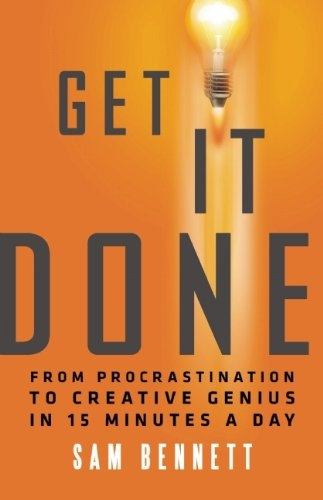
Sam Bennett
New World Library
Softcover $15.95 (272pp)
978-1-60868-210-2
Buy: Local Bookstore (Bookshop), Amazon
What better place to start than with a book titled Get It Done? Sam Bennett, who runs a consultancy that helps creative people get “unstuck,” lays out an action plan replete with exercises—for discovering, prioritizing, executing, and tracking the progress of projects of any kind. Calming those non self-starters with the notion that “procrastination is genius in disguise,” Bennett offers liberating tools, including three “nearly miraculous daily habits,” a self-awareness exercise for readers to identify their heroes and heroic qualities, and, should success strike, sage advice for dealing with “the burden of celebrity.”
Especially useful is the author’s pragmatic approach to simply taking one logical step after another. Her book is a battle-tested guide (she has been teaching the methodology since 1996) that delves into the psychology behind picking the right projects, staying on track, managing perfectionism and self-doubt, maintaining enthusiasm, exposing one’s work to the world, and sustaining the effort over a lifetime.
While Bennett is non-judgmental, she is enthusiastically proactive, offering a verbal kick in the pants. For example, in one exercise, she writes, “Get out a piece of paper and write ‘Could Do’ at the top. I like ‘could-do’ lists because I find ‘to-do’ lists too dictatorial…We’re not trying to think of things that you will do for sure; we’re just brainstorming things that you could do. Maybe you will, and maybe you won’t—we don’t know yet. We’ll just have to see how you feel.” It is Bennett’s no-nonsense yet reassuring attitude that will undoubtedly help procrastinators rise above their roadblocks.
BARRY SILVERSTEIN (February 27, 2014)
I Hear You
Repair Communication Breakdowns, Negotiate Successfully, and Build Consensus…in Three Simple Steps
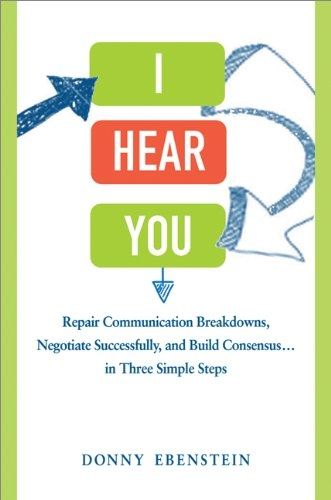
Donny Ebenstein
AMACOM
Hardcover $24.95 (288pp)
978-0-8144-3219-8
Buy: Amazon
Communication and negotiation expert Donny Ebenstein also addresses getting unstuck, but in the context of resolving conflicts with others. Writes Ebenstein, “to truly get unstuck, you need to do more than put yourself in the other person’s place. Rather, you need to build your capacity to see different perspectives at the same time.” The author offers a comprehensive guide to doing just that, moving from exercises and mock dialogue that help define one’s own perspective to understanding and accepting the perspective of others.
Ebenstein doesn’t stop there. He recognizes that getting stuck in your own perspective is as problematic as getting lost in someone else’s perspective. That’s why he helps the reader work on telling both stories at the same time. The author offers role playing and other exercises that hone the skills necessary to succeed at this duality.
While Ebenstein deals primarily with conflict resolution in the workplace, it becomes increasingly clear that the book’s strategy can just as easily be applied to any one-to-one interaction. He counsels the reader that there are three possible outcomes in any stuck situation: It gets better and the relationship improves, it remains the same and one deals with the status quo, or it just can’t be fixed and one walks away from it. Ultimately, Ebenstein’s approach is really about empowerment.
Ebenstein writes with authority and impartiality, drawing on his years of experience to explain and illustrate by example his approach to repairing communication breakdowns. Mastering the skills Ebenstein describes here should vastly improve anyone’s ability to build consensus.
BARRY SILVERSTEIN (February 27, 2014)
Brave Parenting
A Buddhist-Inspired Guide to Raising Emotionally Resilient Children
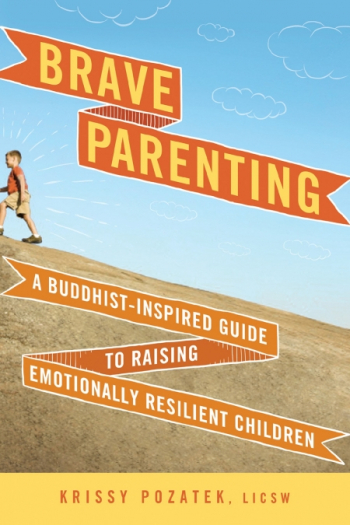
Krissy Pozatek
Wisdom Publications
Softcover $17.95 (200pp)
978-1-61429-089-6
Buy: Local Bookstore (Bookshop), Amazon
When it comes to parenting, being brave equals letting go, according to social worker Krissy Pozatek. She writes that “many parents are busy cushioning their children from any discomfort.” Pozatek invokes the Buddhist philosophy of “making our own moccasins” to protect our feet on the path of life rather than “laying down leather wherever we step so we don’t cut our feet.” Writes the author, “Leather laying makes our children more dependent and less resourceful and impedes their emotional maturation process.”
Pozatek brings her experience working in adolescent wilderness-therapy programs to bear in a book that is as much about tough love for parents as it is for children. She advises parents to allow kids to feel because “Struggle is not something to cover up or get rid of.” She encourages reflective listening, setting limits to make children feel safe, allowing children to experience consequences, and letting children do their own problem solving. All of this advice is meted out in text that gently but firmly guides parents away from living their children’s lives and toward enabling their children’s independence.
To illustrate her key points, Pozatek uses anecdotes about parents and children shaped by her own experience as a therapist. The exercises she recommends, such as free writing in a journal, are designed to help suppress any parental insecurities. Some parents may not feel entirely comfortable advising rather than sheltering their children, but Pozatek’s compassionate, mature way of examining contemporary parental behaviors—and demonstrating the positive payback of remaining objective—should ease parents’ concerns and help them master “brave parenting.”
BARRY SILVERSTEIN (February 27, 2014)
The Master Key
Qigong Secrets for Vitality, Love, and Wisdom
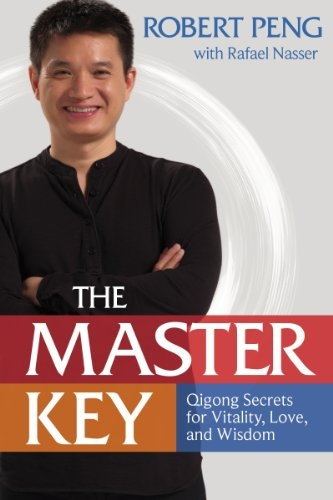
Robert Peng
Rafael Nasser, contributor
Sounds True
Softcover $21.95 (342pp)
978-1-62203-139-9
Buy: Local Bookstore (Bookshop), Amazon
Very few people will ever achieve Robert Peng’s mastery of Qigong which, he writes, “is the science of cultivating our Life Force through specific practices as well as the art of applying this energy in the service of the Dao, or the greater good.” Peng, who was taught Qigong by an elderly Chinese master, shares a comprehensive program for understanding, learning, and practicing this spiritual art. The author’s approach is detailed in this book plus nine follow-along videos and two audio downloads, available on his website.
Peng begins by telling the story of his own journey which, in and of itself, is a fascinating look at one man’s spiritual evolution. This story acts as a precursor to instructing the reader on how to awaken the body’s “Four Golden Wheels,” or energy centers. Subsequent chapters present basic Qigong skills and “Essential Practices” that aim to lead one down the path to potentially becoming a Qigong master. Peng augments the text with many black-and-white photographs that depict the author stepping through the exercises.
The reader will need to grow accustomed to concepts that may be unfamiliar, such as the “Three Dantians” and the “Central Meridian,” but Peng patiently explains them in clear everyday terms. The book follows a logical sequence, moving from basic to advanced exercises, nicely sandwiched between Peng’s spiritual awakening at the beginning and his ascension to Qigong master at the end. Well written and illustrated, The Master Key guides the reader through a process that Peng says will result in becoming “a genuinely happy individual.”
BARRY SILVERSTEIN (February 27, 2014)
How to Survive Life (And Death)
A Guide for Happiness in This World and Beyond
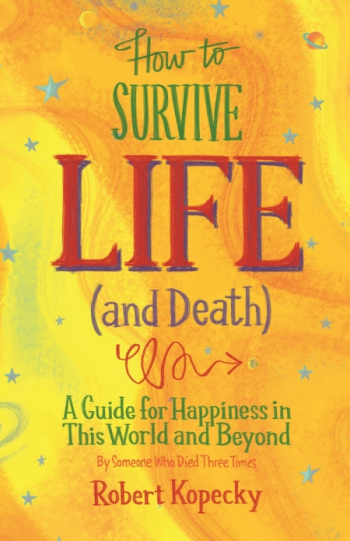
Robert Kopecky
Conari Press
Softcover $16.95 (224pp)
978-1-57324-636-1
Buy: Local Bookstore (Bookshop), Amazon
The ultimate in mastery may well be found in the pages of this spiritually uplifting book, written by a man whose three near-death experiences have informed his fearlessness about facing the afterlife. “Take a look at all the miracles that Life has already been, and always is,” writes Robert Kopecky. “What if you knew it wasn’t all over with this, after all?”
Kopecky promotes the notion of living a life filled with love, compassion, and selflessness, suggesting that a life so lived will not only bring a sense of value and purpose to this life, but carry one peacefully into the afterlife. He urges the reader to adopt a philosophy based on three tenets: radical kindness, radical forgiveness, and radical surrender (the latter he defines as “surrendering to the Universe” to be happy in the afterlife).
The author has a way with words, spinning spiritual philosophy with a good dose of self-effacing humor and a healthy perspective. He writes, “When you look back at the hardest times in your life, you see that they’re over, aren’t they?…In short, happiness is always waiting for us to simply get out of our own way, and find out that we’ve had it all along.” Kopecky strongly believes that “the end really isn’t”; rather, beings live “in a spiritual dimension” once their physical presence is gone. This unabashedly positive book may not leave all readers confident that they can master the afterlife, but it will surely cause many to reconsider their fear of death and dying. And that may be mastery enough.
BARRY SILVERSTEIN (February 27, 2014)
Barry Silverstein
